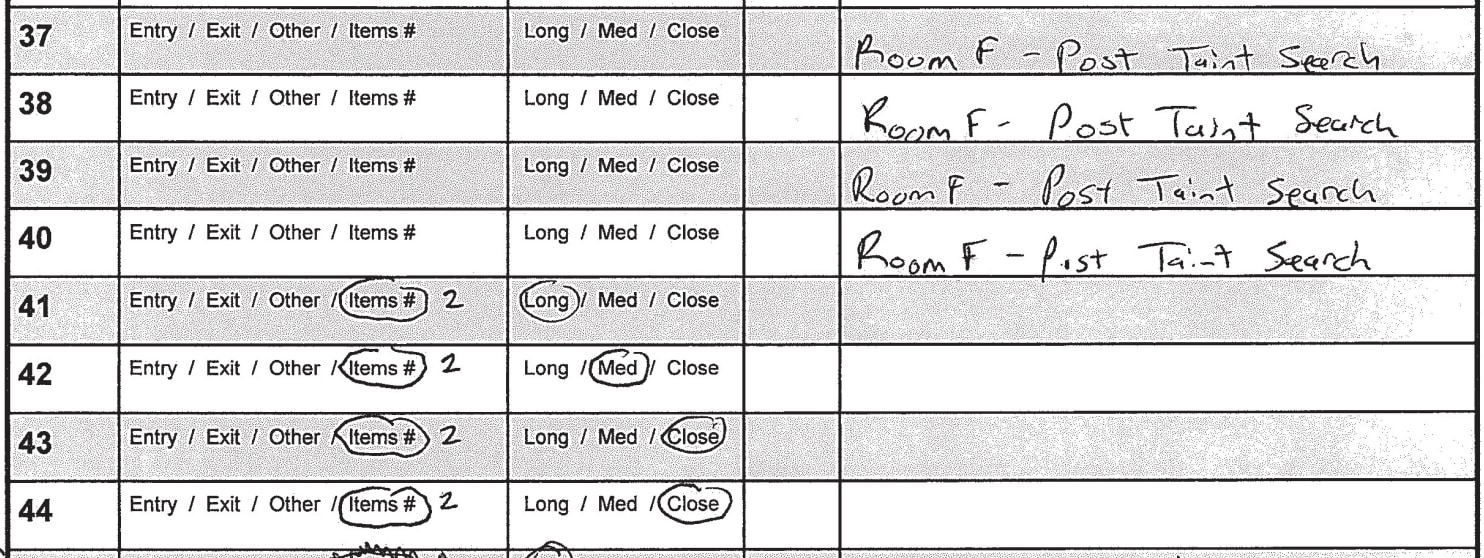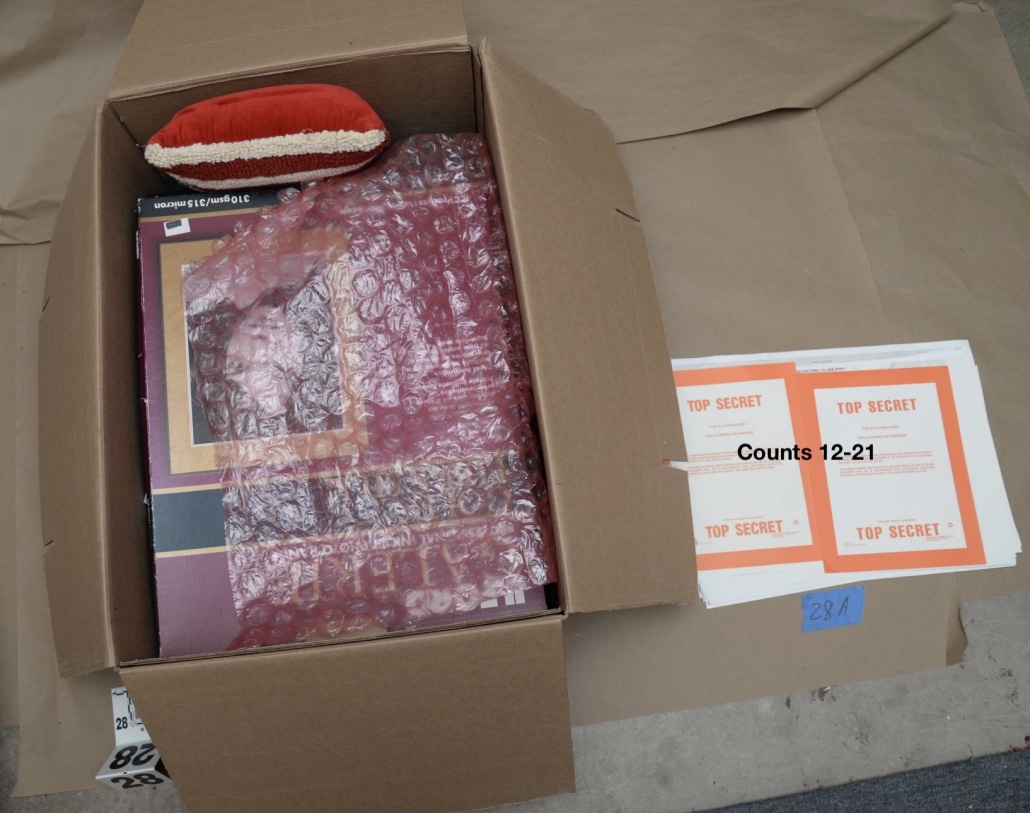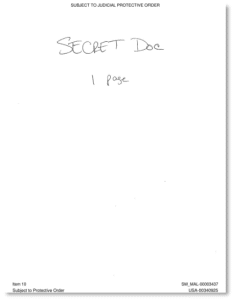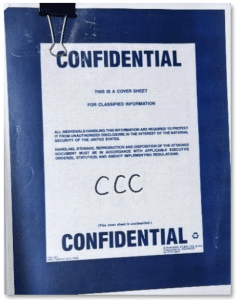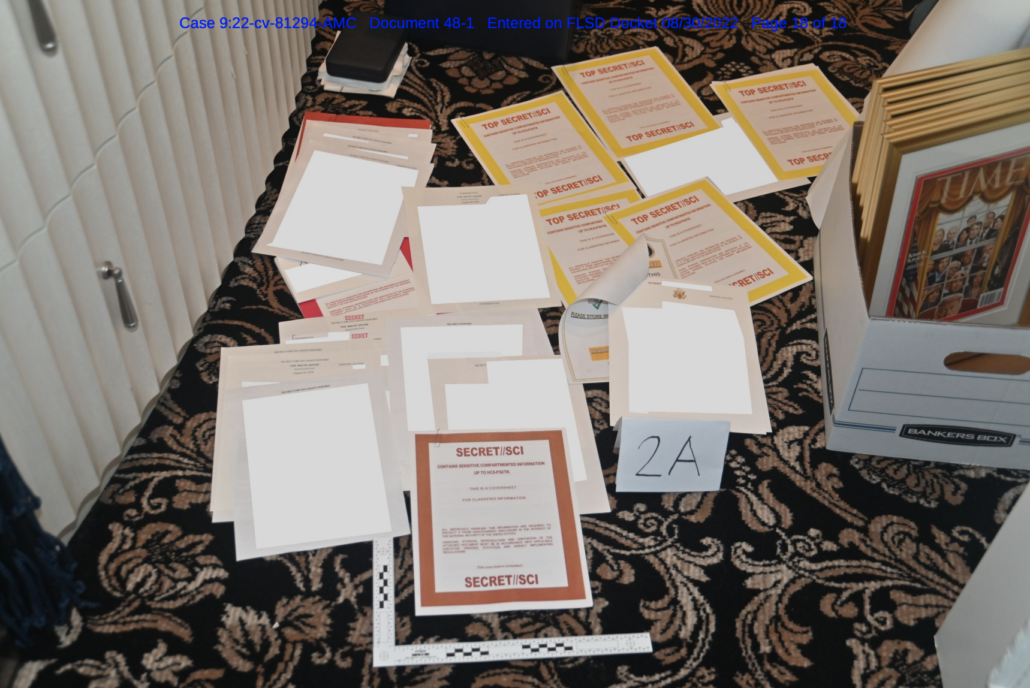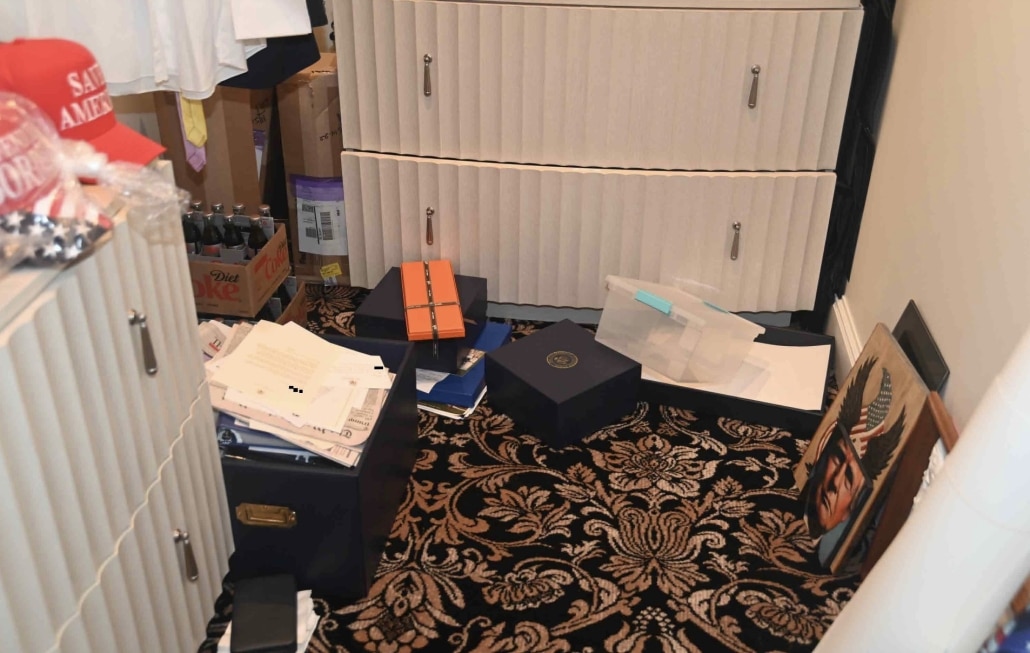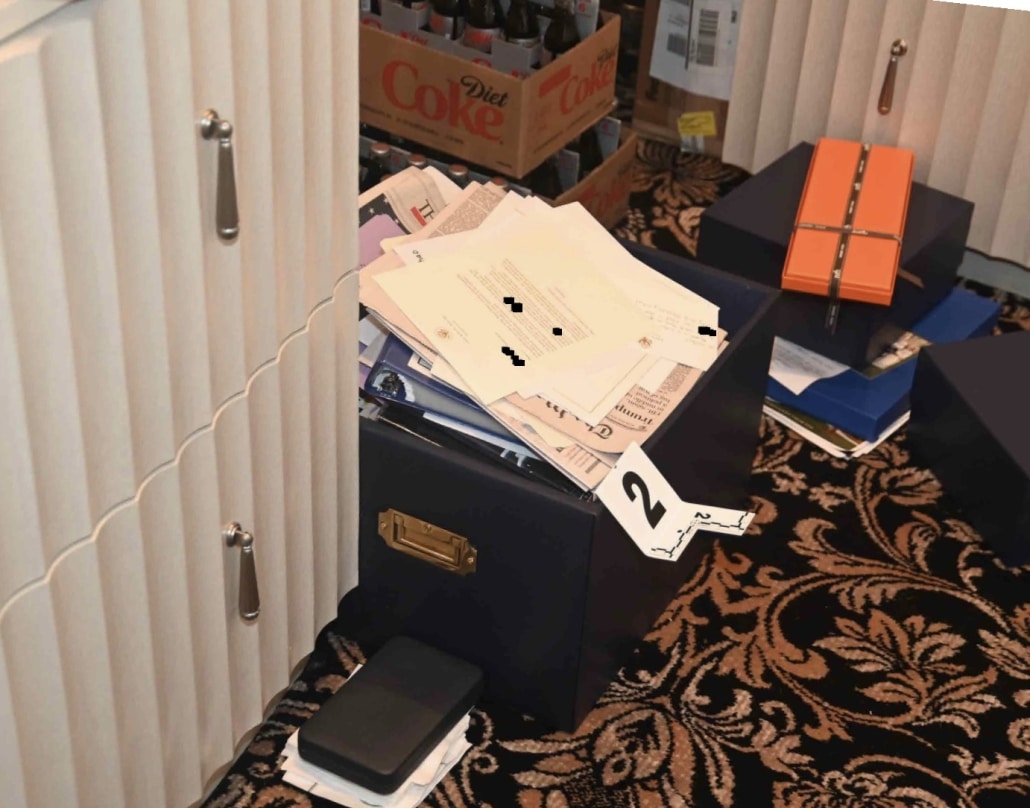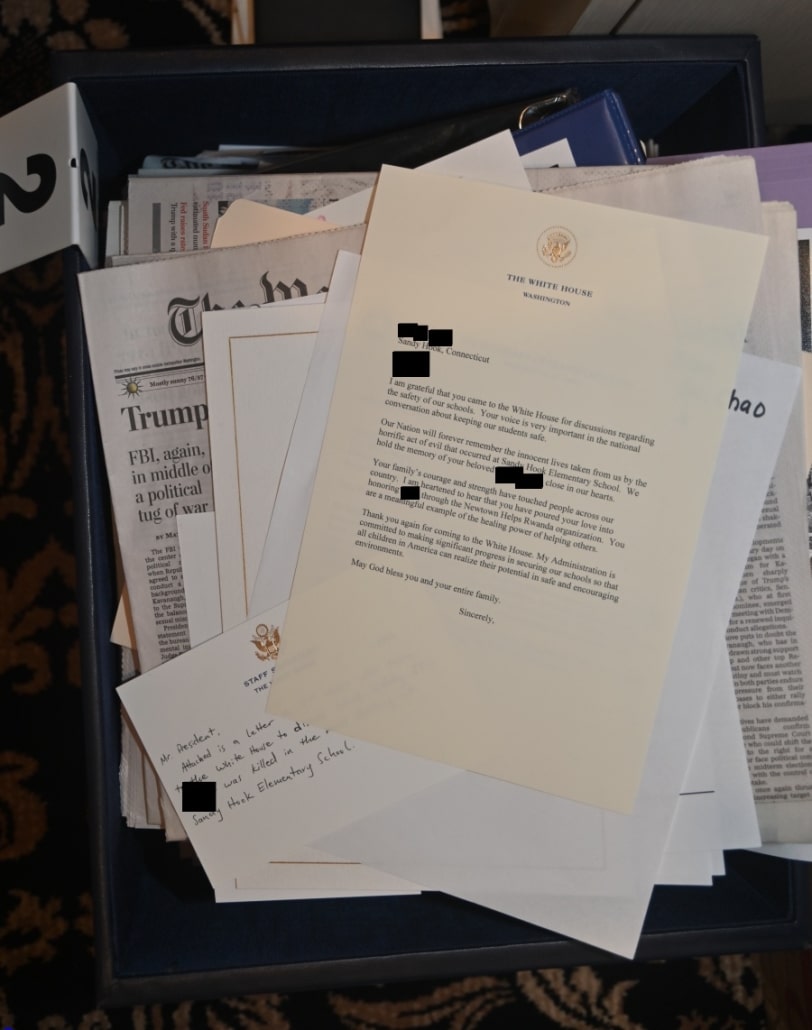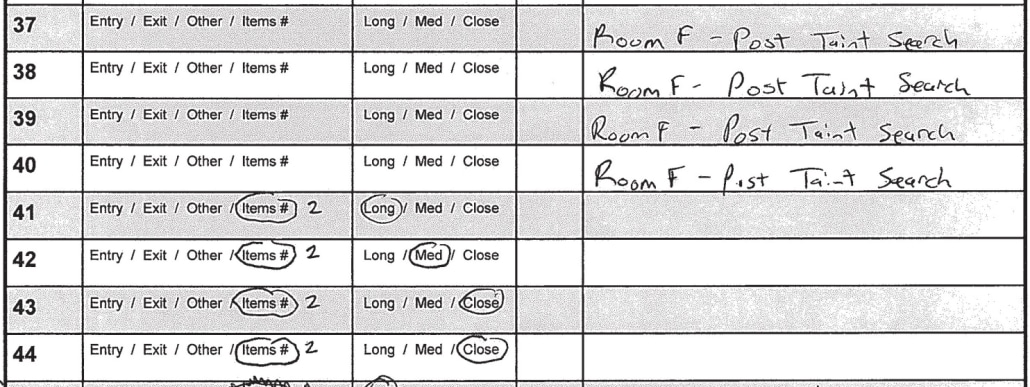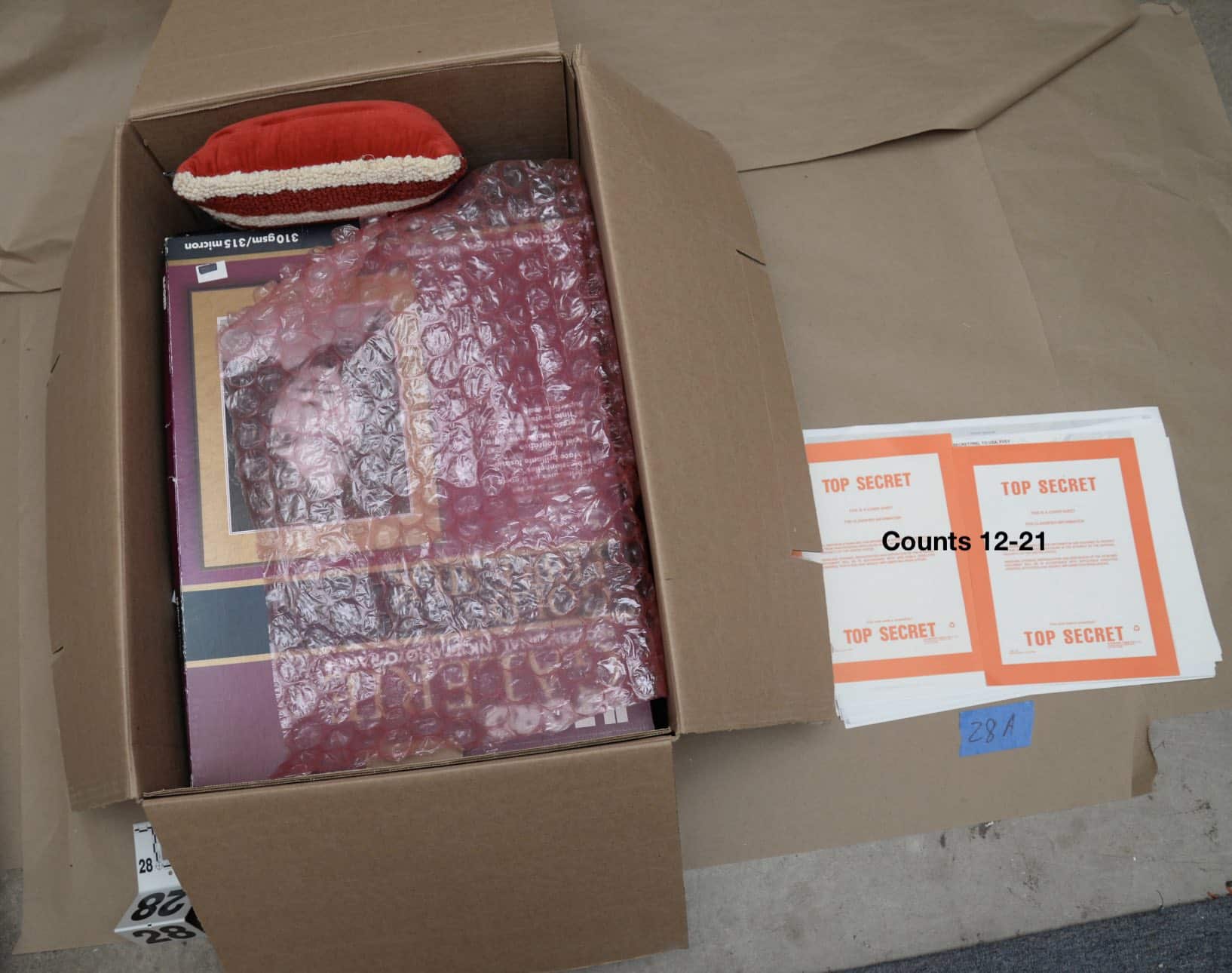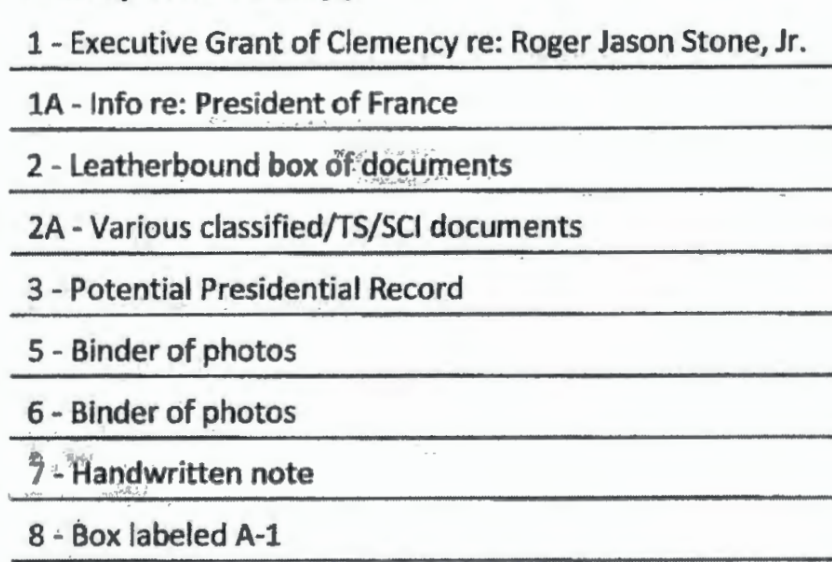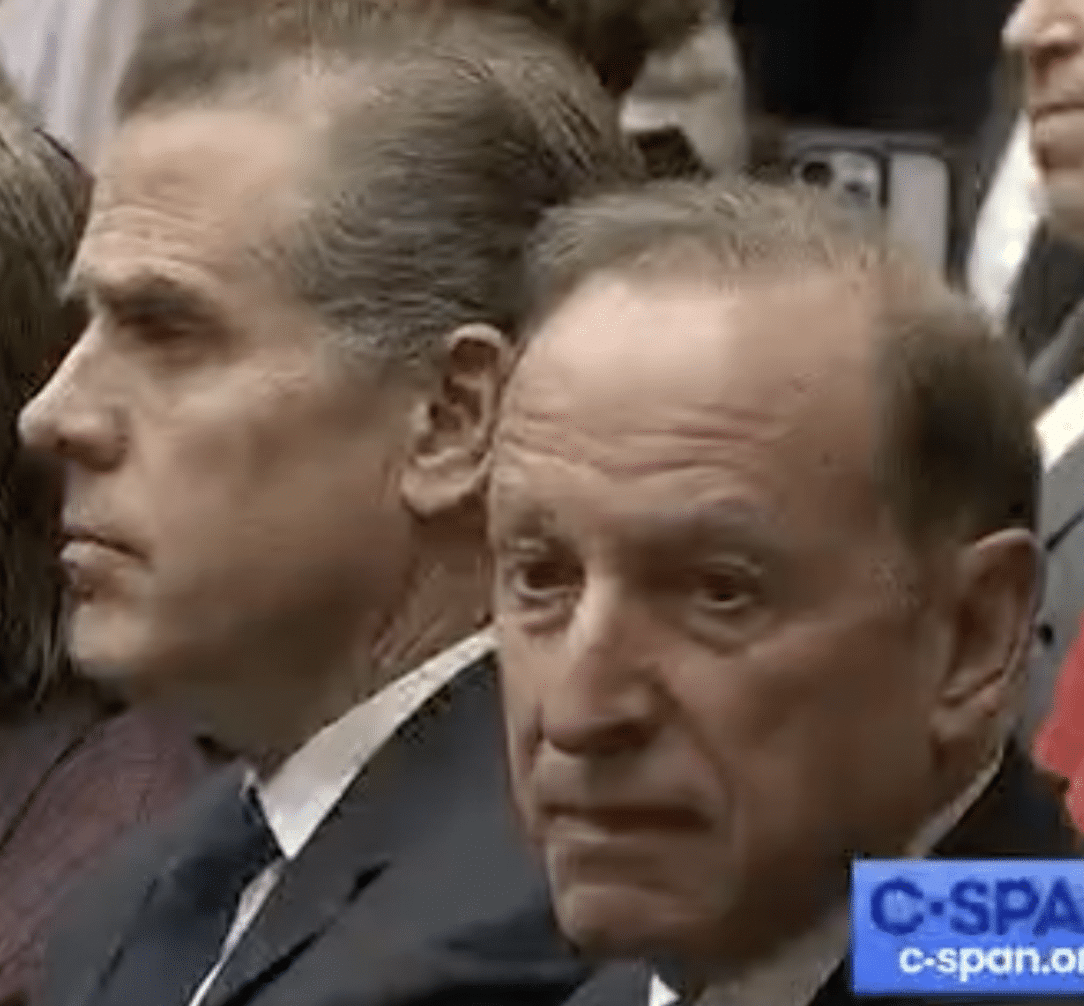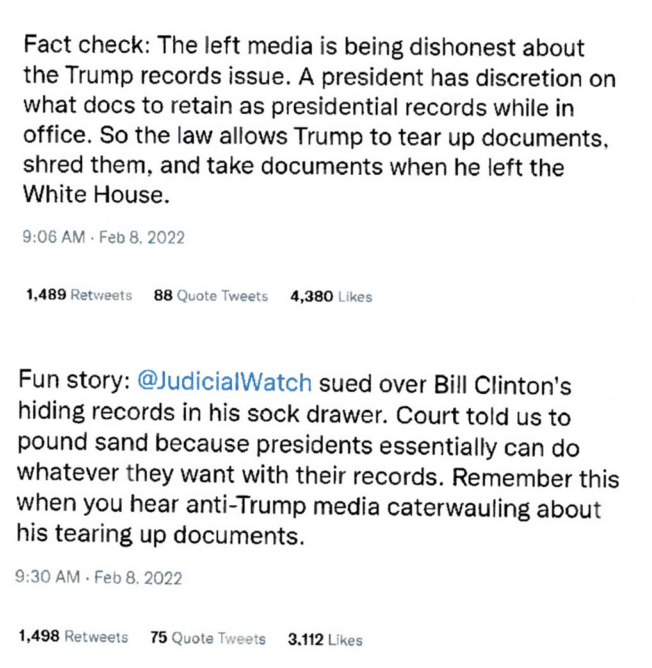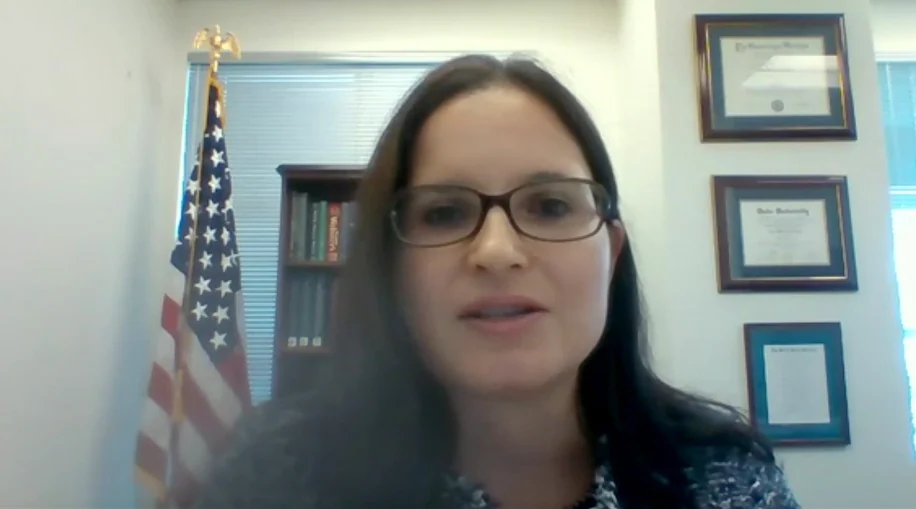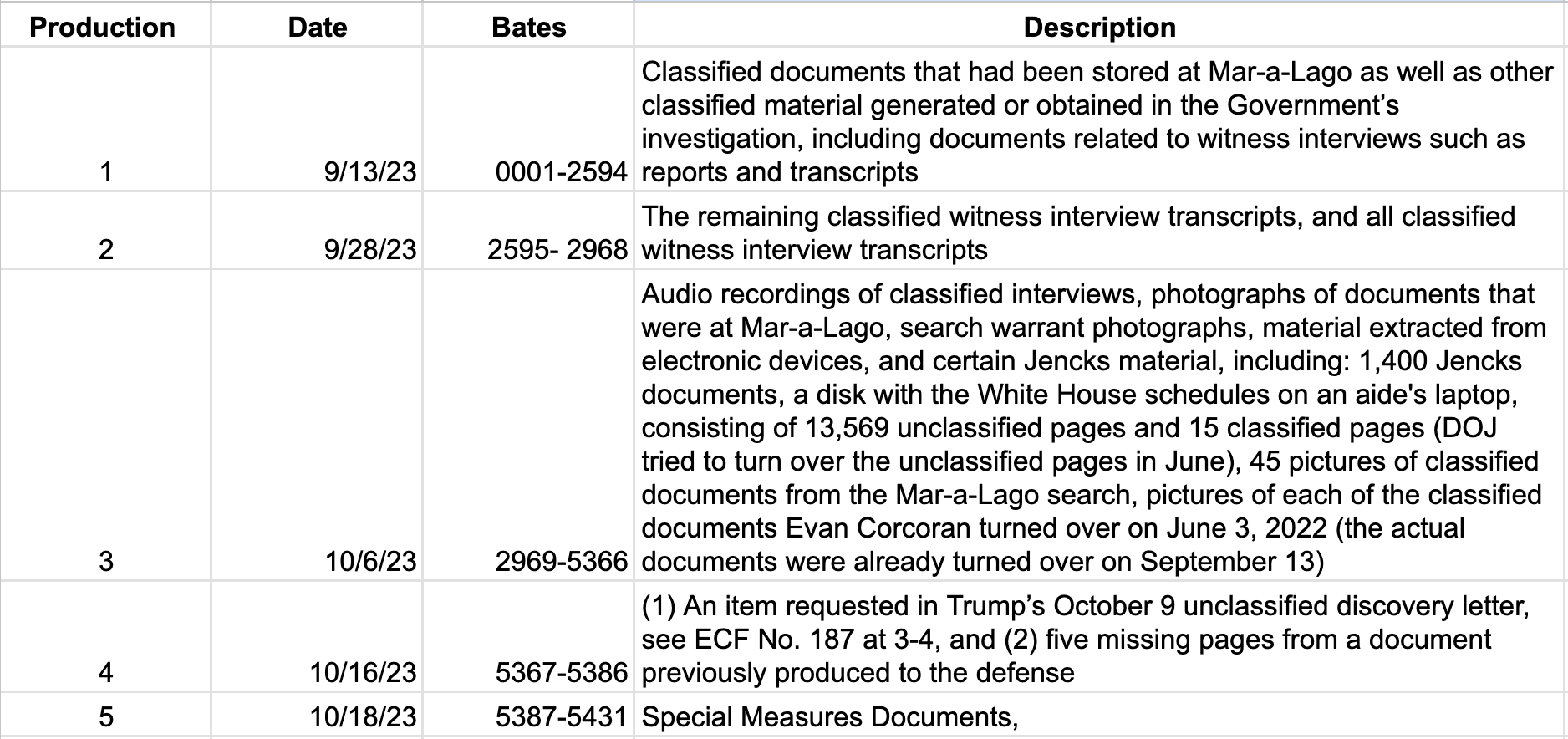The “Wow, Pictures!” Tabloid Coverage of Trump’s Stolen Documents Is as Bad as Conspiracy Mongering
The other day, I mined the documents and photographs released in the government’s response to Trump’s bid to throw out his indictment based on a complaint that the FBI failed to preserve the order of documents in boxes.
Doing so, I showed that Trump had stored ten of the documents charged against him — including one classified under the Atomic Energy Act — under bubble wrap and a Christmas pillow.
I had to do a fair amount of work to figure that out, building on work I did years ago. I had to cross-reference the item number (28, as shown in the picture) with the box number (A-73, which you can find on the warrant return) to determine which box this was. I then cross referenced that with the table of charged documents in the filing.
Then I annotated the picture to describe which charged documents were found in the box myself. You can cross reference that with the indictment to learn what kind of documents are included in the stack in the picture.
All that under the bubble wrap and the Christmas pillow!
But that’s not why DOJ included the picture in its filing. DOJ included this picture, along with the two other pictures in that exhibit and the two in this exhibit, “to provide a sense of the variety of items in the boxes.” And Jack Smith’s team did that to show that FBI agents who conducted the search had no way of knowing that Trump knew (according to the interview of a former White House aide of his) precisely what was stored in which box, and therefore no way of knowing he might cite document order in his own defense.
Furthermore, this is not a case where reams of identically-sized documents were stacked neatly in file folders or redwelds, arrayed perfectly within a box. To anyone other than Trump, the boxes had no apparent organization whatsoever. The boxes contained all manner of items, including, for example, papers of varying sizes, from folded large-format items to tiny notes; clothing; picture frames; shoes; magazines; newspapers; newspaper clippings; correspondence; greeting cards; binders; and Christmas ornaments. The photographs attached as Exhibits 3, 8, and 16 provide a sense of the variety of items in the boxes. The notion that the precise ordering of materials within these boxes possessed any exculpatory value that would be apparent to the Filter Team when they opened the boxes is absurd.
These pictures also corroborate what filter team agents said about their efforts to retain the order of items in these boxes as they searched them for any potentially privileged documents, such as Agent 5’s description that it was impossible to retain the order because of the “[loafers], newspapers, post-it notes, golf balls, etc” she found in the boxes. For the most part, these were not boxes of file folders (like the one found in Joe Biden’s garage, the order of which FBI also disrupted; they were boxes of Christmas pillows and bubble wrap, and that’s one of several reasons why the document order within boxes was not maintained in all boxes.
There was a purpose to these photos, and it went well beyond slob-shaming the former President or just showing how DOJ released these pictures to portray Trump as chaotic. The photos and other exhibits make a specific rebuttal to an argument Trump is making: that FBI willfully mixed up document order to undermine a foreseeable future defense that was radically different to the one — that he knew the documents were there, but had declassified everything — he had been making before the August 8, 2022 search.
There was a purpose to these photos: To rebut a range of conspiracy theories designed to undermine rule of law and truth itself.
The coverage from most mainstream journalists (I excuse those who were stuck in Aileen Cannon’s courtroom who just threw up a post after that tedium) consisted of little more than “ooh, pictures!” which quickly turned into slob-shaming that failed to provide any context about the legal significance of the exhibits or the chain of custody they depicted.
There were several other things the filing and pictures were meant to explain: notably, what and how cover sheets got put into boxes, and — because Julie Kelly is a shameless propagandist — whether the FBI brought cover sheets for the sole purpose of framing Donald Trump.
This conspiracy theory started when Stan Woodward spent 1:50 examining physical document boxes. He took this picture, of Box A-14, which has only around 35 documents in it, all stacked up neatly, but otherwise spent little time examining this box — just 6 minutes.
This box was originally segregated because it had potentially privileged documents in it. Days later, an FBI agent discovered a single document marked with Top Secret markings. That document, dated May 6, 2019 and describing a White House intelligence briefing, is charged in Count 4 of the indictment.
Woodward made no claim that the cover sheet in this box, wherever it is, was out of place.
Woodward spent more time reviewing box A-15: 18 minutes. He didn’t take a picture (but the FBI did). Box A-15 was found with a binder in it, containing 21 Secret documents and 11 Confidential documents.
When Woodward inspected this box, he discovered that the order of the cover sheets marking classified documents reflected in the scan done for the Special Master review conflicted with the order he discovered them when he reviewed the box itself.
For this box, because it was one originally inspected after the FBI ran out of cover sheets they brought with them (they didn’t expect so many classified documents!), there were three sets of cover sheets used with the document. The generic cover sheet marking the highest level of classification mark found in the box, depicted in the picture above, which the FBI took to document its search; hand-written cover sheets they used to mark individual documents after they ran out of the normal cover sheets the day of the search;
And cover sheets marked with each individual document index ID (the “ccc” in the picture) after they indexed everything.
The documents in this box were indexed as “ccc” through “iii” and then “www” through “tttt.”
For this box, each of those three cover sheets served a different purpose. The first played a role in an evidentiary picture, to document the search, and yes, the FBI put that cover sheet there on purpose to both cover up classified information and to mark how sensitive it was.
The second was a place marker for each document taken from the box and kept more securely, and the third was a cover sheet to track each individual classified document.
But this box, in particular, ended up getting particularly jumbled because there were so many classified documents all appearing in a binder.
11 The initial placeholder sheets that were put in Box A-15, unlike most of the others, included only the classification level and the number of pages. Because of the large number of documents with classification markings (32) in box A-15, which were found in a binder of information and therefore similar in nature, it was not possible for the FBI to determine from the initial placeholder sheets which removed documents corresponded to which classified document. In this instance, therefore, the FBI left the initial handwritten placeholder sheets within the binder to denote the places within the binder where the documents with classification markings were found. The FBI provided this binder for scanning at the top of the box. In addition, the FBI placed in the box 32 new placeholder sheets representing the 32 documents with classification markings in the binder. It placed them where the binder was within the box when the investigative team obtained it. None of the 32 documents is charged.
I don’t excuse that — the FBI flubbed boxes in both the Biden and Trump investigations. But as noted, in this case, it won’t be relevant to any defense Trump will offer because these documents aren’t charged.
The fact that FBI used cover sheets to mark and cover the contents of classified documents when documenting the search (as in the two pictures above) led propagandist Julie Kelly to imagine that the original photo released in an exhibit back in August 2022 must be a set-up, with the FBI using a bunch of classified cover sheets solely to make Donald Trump look worse than he was.
Julie got way over her skis claiming that Jay Bratt lied when he introduced a reference to the picture by saying that, “Certain of the documents had colored cover sheets indicating their classification status.”
The photo was a stunt, and one that adds more fuel to this dumpster-fire case.
Jay Bratt, who was the lead DOJ prosecutor on the investigation at the time and now is assigned to Smith’s team, described the photo this way in his August 30, 2022 response to Trump’s special master lawsuit:
“[Thirteen] boxes or containers contained documents with classification markings, and in all, over one hundred unique documents with classification markings…were seized. Certain of the documents had colored cover sheets indicating their classification status. (Emphasis added.) See, e.g., Attachment F (redacted FBI photograph of certain documents and classified cover sheets recovered from a container in the ‘45 office’).”
The DOJ’s clever wordsmithing, however, did not accurately describe the origin of the cover sheets. In what must be considered not only an act of doctoring evidence but willfully misleading the American people into believing the former president is a criminal and threat to national security, agents involved in the raid attached the cover sheets to at least seven files to stage the photo.
Classified cover sheets were not “recovered” in the container, contrary to Bratt’s declaration to the court.
The frothy right has been trying to claim this photo was a frame job from the start. But Julie’s theory was a particularly stupid version of the conspiracy theory. If the idea was that cover sheets make the documents look worse than, say, visible classification marks like the ones visible if you look more closely, and the more cover sheets the more useful for framing Donald Trump, why not use cover sheets on all of them? In a piece that otherwise struggled with the difference between [Box] Two and [Box] Ten, Julie counted seven cover sheets in the picture. I think there are at least eight (plus another form of cover sheet) but — another data point that undermines her conspiracy theory — a Secret cover sheet is buried in the middle of the stack, useless for the propaganda value Julie’s conspiracy theory has dreamt up.
While last week’s filing didn’t take on Julie’s conspiracy theory head on (notably, Trump has not adopted her conspiracy theory, which should tell you something), it did include the materials to understand how the initial evidentiary picture got put together.
As noted in the Jay Bratt language Julie quotes, the contents in that picture were found in a container in the “45 Office,” what Mar-a-Lago staffers called Trump’s office. The warrant return described the box holding the most sensitive documents, item 2, as a “leatherbound box of documents.”
That’s one of many ways we can be sure that this picture — which the “ooh pictures! people were very excited about mostly on account of the Diet Coke bottles, which I think short-changes the cult Donald Trump picture in the right side — depicts the same box.
The next picture in that exhibit shows how that same box got labeled Box 2, the box that Julie the Propagandist would one day confuse with Item 10.
Another picture shows what the top of the box looked like (since this is post taint search — the unsigned Sandy Hook letter that some “ooh photos” journalists claimed must be a super sensitive document, on account of hiding the name of the child gunned down at Sandy Hook — may not have been on the top of the stack when the FBI first found it).
The filing even includes the photo log showing how the photographer took pictures first of the closet (Room F), then of the box, then of the contents of the box.
Here’s that evidence photo again, which would have been taken in the foregound of the wide view picture above, with the rolled up paper and the seeming book now appearing at the top of the picture, and the tacky dresser on the left.
The picture was misleading when released, but not for the reason Julie the Propagandist suggests. It was misleading because it suggested that Trump put his Top Secret documents in with his Time Magazine covers. He didn’t. He put them in a different box, a few feet away, also in his office closet with the awful carpeting.
The filing that Julie the Propagandist claimed vindicated her conspiracy theory does the opposite. The government filing reiterates the claim — the claim that Julie the Propagandist claims caught Jay Bratt in a lie — that “Certain of the documents had colored cover sheets indicating their classification status.”
The 45 Office consisted of the “ante room,” where Trump staff members had desks (Room B); Trump’s office (Room C); a closet attached to Trump’s office (Room F); and two bathrooms (Rooms D and E). Ex. 9. Entry photos were taken of the ante room, Trump’s office, and both bathrooms. Id. Filter Team agents then discovered in the closet a blue, covered, leatherbound box full of various papers, including numerous newspapers, newspaper clippings, magazines, note cards of various sizes, presidential correspondence, empty folders, and loose cover sheets for classified information, as well as documents marked classified. Ex. 10. FBI 13 conducted the privilege review of this box, with some brief assistance from FBI 5. ECF No. 612-11 at USA01291471. FBI 13 was careful to return all items to the box after reviewing them, but did not maintain the order of the items. Id. at USA-01291472; Ex. 11 at USA-01291691. FBI 13 found no potentially privileged materials in the box. ECF No. 612-1 at USA-01291485. After FBI 13 placed all of the contents of the blue box back in the box, an ERT photographer took photos of the blue box with the cover off. Ex. 12. FBI 13 alerted the Case Team that s/he had found documents marked classified, and after s/he completed his/her privilege review, two Case Team agents reviewed the box and found numerous documents with classification markings, some of which had classification cover sheets already attached, as well as loose classification cover sheets. The Case Team agents seized the documents marked classified (as well as any cover sheets already attached) and segregated them. As they extracted the seized documents, they inserted placeholder sheets where they found them. [my emphasis]
To be sure, there’s still a step of this progression that the government didn’t include in its filing (again, this is not the primary focus of the filing because Trump has not adopted Julie the Propagandist’s conspiracy theory, at least not yet, and — one exhibit included last week also made it clear– Trump’s people had turned on CCTV surveillance before the search started, and investigators knew that).
Trump’s initial MTD included notes and last week’s filing includes a follow-up interview with Agent 13. Agent 13 was the primary person who did the filter search of the closet. The original notes describe the agent, “does recall seeing cover sheets inside box[,] don’t know one way or other if cover sheets in photo came from box.” In the follow-up, the agent described that the lid to the leatherbound box was on the box when they found it (meaning the evidence pictures thereafter reflect what happened after the filter search).
That testimony is utterly consistent with the picture: that at least some of the cover sheets in the picture are the ones Agent 13 found when they did the search. But you’d need to add the testimony of the photographer and the two investigative agents to learn whether all of them were, or learn whether any of the loose cover sheets in the box were also used in the photo.
Nevertheless, it’s a pointless conspiracy theory. Julie the Propagandist has made a big deal out of cover sheets used in the way cover sheets are supposed to be used: to convey that something is classified and prevent any incidental exposure. But the picture doesn’t, primarily, show cover sheets. Indeed, it shows at least ten documents without classified cover sheets (covered instead with blank cover sheets), virtually all with classification markings visible.
More importantly, what the filing and the original photo both show the chain of custody of a box that — no amount of squealing about cover sheets disputes — clearly shows at least 22 of the 24 documents alleged to have been found in the box, most with classification markings visible.
Tracking what these exhibits do explicitly and — with more effort — implicitly takes time. But responding to conspiracy theories with facile reporting squealing, “Ooohh pictures” serves nobody, except media outlets looking for free reporting and conspiracy theorists hoping to turn truth into a both-sides dispute.

